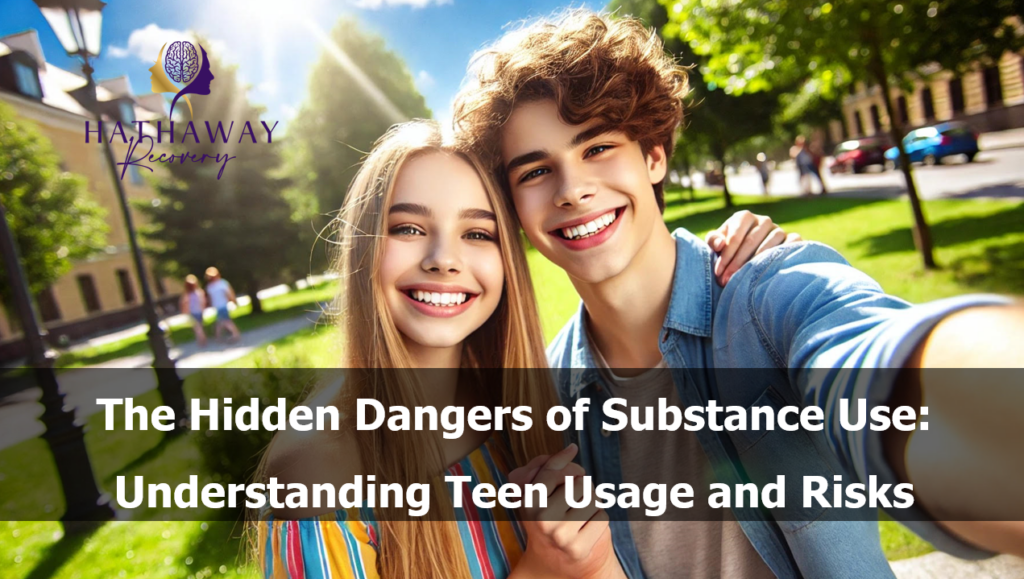
Substance use, often involving various drugs marketed under misleading names, has seen a worrying rise in popularity among teenagers. Despite its portrayal as a legal and safer alternative, substance use poses severe and often unpredictable risks. This comprehensive exploration delves into the composition, appeal, and significant dangers of substance use, aiming to raise awareness and promote preventive measures.
What is Substance Use?
Substance use involves the consumption of various drugs, often created in laboratories and lacking consistent regulation and oversight. These substances can vary drastically in their potency and effects, making them particularly dangerous. The unpredictable nature of these substances can lead to severe health risks and long-term consequences.
Why Teens Engage in Substance Use
Understanding the motivations behind teen substance use is key to addressing this growing issue. Several factors contribute to the allure of substance use among teenagers:
1. Perceived Legality and Safety: The packaging and marketing of certain substances often imply that they are legal and safe. This misconception is reinforced by their availability in shops and online, where they are sold openly.
2. Ease of Access: Many substances can be purchased relatively easily. They are often sold in convenience stores, gas stations, and online platforms, making them accessible to teenagers who might find it challenging to procure other substances.
3. Evasion of Drug Tests: Some substances are not detected by standard drug tests. This makes them attractive to teens who wish to avoid the repercussions of a positive drug test in school, sports, or at home.
4. Curiosity and Peer Pressure: Teenagers are naturally curious and influenced by their peers. The novelty and perceived exoticism of substance use can make it seem like an enticing choice for experimentation.
The Risks and Dangers
The risks associated with substance use are numerous and often more severe than those linked to more familiar substances. These risks stem from the unpredictable nature of the substances used:
1. Unpredictable Chemical Composition: The chemicals in these substances are often untested and vary widely. This inconsistency can result in extreme potency, leading to severe health consequences. Users have reported experiencing acute kidney injury, seizures, and even heart attacks.
2. Mental Health Effects: Substance use can have profound and dangerous effects on mental health. Users frequently report severe anxiety, paranoia, hallucinations, and aggressive behavior. For teenagers, whose brains are still developing, these effects can be particularly damaging, potentially leading to long-term mental health issues.
3. Physical Health Risks: Beyond mental health, substance use poses significant physical health risks. Respiratory problems, gastrointestinal issues, and severe toxicity leading to hospitalization or death have all been documented. The lack of regulation means users are ingesting unknown substances, leading to unpredictable and often dangerous outcomes.
4. Addiction and Withdrawal: Substance use can be highly addictive. Users may develop a tolerance, requiring higher doses to achieve the same effect, which increases the risk of adverse reactions. Withdrawal symptoms can be severe, including extreme anxiety, agitation, and physical discomfort, making it challenging for users to quit.
Case Studies and Real-life Consequences
To illustrate the dangers of substance use, consider the following case studies:
– Case Study 1: A 16-year-old boy was hospitalized with acute kidney failure after using a substance he purchased from a local gas station. His condition required intensive medical treatment and left him with long-term health issues.
– Case Study 2: A group of teenagers in a suburban high school suffered severe psychological effects, including paranoia and hallucinations, after experimenting with substances. The incident led to a school-wide crackdown and increased awareness programs.
Preventing Teen Substance Use
Preventing teen substance use requires a comprehensive approach involving education, regulation, and support:
1. Education: Raising awareness about the dangers of substance use is crucial. Schools should incorporate information about the risks into their health education curricula. Parents and community organizations should also engage in open discussions with teens about the hazards of substance addiction.
2. Regulation and Enforcement: Stronger regulations and enforcement can help limit the availability of harmful substances. This includes stricter controls on the sale of substances, both online and in physical stores, and more rigorous enforcement of existing laws.
3. Support and Resources: Providing support and resources for teens struggling with substance addiction is essential. This includes access to counseling, mental health services, and substance abuse programs that can help teens make healthier choices and cope with the pressures that lead them to substance use.
4. Parental Involvement: Parents play a critical role in preventing substance addiction. Open communication, setting clear expectations, and being involved in their children’s lives can help reduce the likelihood of teens turning to substance use.
5. Community Programs: Community-based programs that offer safe and engaging activities for teens can provide alternatives to substance use. Mentorship programs, sports, arts, and other extracurricular activities can help occupy teens’ time and offer positive role models.
The hidden dangers of substance use are profound and far-reaching, particularly for teenagers. Understanding the appeal, risks, and real-life consequences of substance use is essential for preventing its spread. By combining education, regulation, support, and community involvement, we can create a safer environment for teens and help them make healthier choices. For those struggling with substance addiction, Hathaway Recovery offers hope of recovery. Their dedication to renewing and rebuilding lives is evident in their comprehensive approach to treatment and care. With a promise of a new beginning, Hathaway Recovery extends its helping hand to those in need. Their Admission Department provides confidential assistance and can be reached at (909) 971-3333, offering a pathway to recovery and a chance to embark on a transformative journey towards a healthier, fulfilling life. Raising awareness about the dangers of substance use is not just a parental or educational responsibility, but a community imperative.






